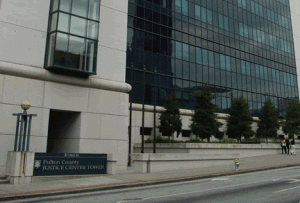The easy answer to the question I pose above is an emphatic “Yes!” Right? For any homeowner to have his or her home wrongfully foreclosed upon and scheduled to be sold at auction on the Courthouse steps, as we still do here in Georgia through nonjudicial forclosures ( a topic which deserves it’s own blog), would create enormous, undue emotional stress. Your home is, more than likely, the largest purchase you have ever made and has the highest financial investment value of anything you have ever personally invested in. We call our home our “castle.” So when a corporation wrongfully forecloses on your castle, your home, trying to sell the house right out from under your homeowning feet, don’t you think this would just naturally cause you some undue stress? Worrying whether you would lose your house? Lose your biggest investment? Lose the roof over your and your family’s heads? Should whoever did so wrongfully foreclose on your house have to face justice in the form of a jury?
One would thing so, but when it comes to our ever-increasing conservative Eleventh Circuit Court of Appeals, the answer, unfortunately, seems to be “not so fast.” In a recent 11th Circuit opinion, the Court held although a person in such a position of being wrongfully foreclosed upon may very well have a claim of intentional infliction of emotional distress, the amount of proof one must offer just to get past the judge and get to a jury may be impossible to meet, thus ending the homeowner’s ability to seek redress for the wrong. In Lodge v. Kondaur Capital Corp., et. al, issued on May 8, 2014, the Eleventh Circuit (of which Georgia is a part) held that the plaintiffs, the Lodges, had not offered enough “proof” of emotional distress suffered by them at the thought of their home being wrongfully foreclosed upon. The Lodges, at the time, were in bankruptcy. Federal bankruptcy laws forbid foreclosure upon a home that is in bankruptcy. The Defendants in Lodge willfully violated this law, known as the “Bankruptcy stay” and moved to foreclose upon the Lodges home, even though that was the very reason the Lodges had filed for bankruptcy.
The Court found against the Lodges, denying them the right to have a jury decide their case. The Court said the Lodges hadn’t offered the Court enough proof of emotional distress. But whether there is sufficient proof of a claim should be a question to be decided by a jury, not three appellate judges. As the attorney for the Lodges, Ralph Goldberg, noted in response to this narrow opinion, “I don’t understand why anybody would not think that…hearing that your house is about to be foreclosed upon is significant emotion distress. It seems to me they’re out of touch with how normal people lead their lives.”
Exactly, Mr. Goldberg. It should have been a jury of twelve “normal people” deciding whether the Lodges suffered emotional distress worrying whether they would lose their home, not three appellate judges who have probably never faced such a threat. And yet a jury will now never hear their case.
This is a sad reality in many civil justice systems, not only in Georgia but across the nation. The number of civil jury trials is shrinking, which means the number of American citizens who are able to obtain justice for their damages, is also declining. When that happens, Americans begin to lose confidence in the entire judicial system, which is something we simply can’t afford. The American Board of Trial Advocates (ABOTA), of which I am an elected member, has recently issued a white paper on this very subject, Preserving a Fair, Impartial and Independent Judiciary. ABOTA’s mission is this:
“The American Board of Trial Advocates is a national association of experienced trial lawyers and judges dedicated to the preservation and promotion of the civil jury trial right provided by the Seventh Amendment to the U.S. Constitution. First and foremost, ABOTA works to uphold the jury system by educating the American public about the history and value of the right to trial by jury.” Preservation of the right to trial by jury is at this mission’s very core. I am proud to be a member of ABOTA.
It is discouraging when the question to be decided is clearly one to be decided by a jury of one’s peers, and yet a Court refuses ever to allow that to happen. When the question of a case is “What is reasonable?” a jury should decide that. Regardless of how the jury decides that issue, citizens are much more likely to feel like they have received a fair shake in the judicial system than if a Court, either one trial judge or a panel of appellate judges, decides that issue on their own. We have a constitutional right to a trial by jury, even in civil cases in which money damages are at stake, not someone’s liberty. The Lodge opinion casts all that into doubt.
Robin Frazer Clark pursues justice for those who have personal injury claims as a result of being injured in motor vehicle wrecks, trucking wrecks, defective products, defective maintenance of roads, medical malpractice and other incidents caused by the negligence of others. Ms. Clark is the Past President of the State Bar of Georgia and the Past President of Georgia Trial Lawyers Association and has practiced law in Georgia for 26 years. Mrs. Clark is listed as one of the Top 50 Women Trial Lawyers in Georgia and is a Georgia Super Lawyer.
 Atlanta Injury Lawyer Blog
Atlanta Injury Lawyer Blog













